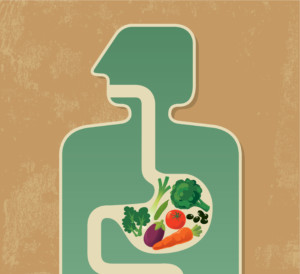
To Digest or Not To Digest: That is the Question
by Mark J Kaylor
Most of us don’t give our digestion a second thought, we chew, and then swallow, figuring our work is done. Also, far too many of us have just come to accept gastric upset as the status quo as we swallow more and more antacids.
There is a reason the leading over-the-counter medicines in the US are designed to relieve digestive disturbances.Further complicating the situation, digestive and absorptive dysfunctions are involved in the majority of chronic disorders even when there is no apparent connection to the digestive tract.
These mal-digestive and mal-absorptive disorders over time contribute to a deficiency of the refueling and resupplying of the body and its cells. Probably the biggest causes of indigestion are simple; we eat too much, too fast and the wrong “foods” (the quotations around foods is because, for far too many of us, what we consume cannot really be called food). For many of us, if we would just be attentive to these three issues, we would resolve, or at least significantly improve, our digestive woes.
 Digestive health is so much more important than just breaking down food. It is the basis for good health and if confronted with a disease or an imbalance, healing becomes much more difficult with an under functioning digestive tract. Digestive disorders can be associated with virtually every disease, especially the chronic, long developing ones, either directly (causally) or indirectly (contributing).
Digestive health is so much more important than just breaking down food. It is the basis for good health and if confronted with a disease or an imbalance, healing becomes much more difficult with an under functioning digestive tract. Digestive disorders can be associated with virtually every disease, especially the chronic, long developing ones, either directly (causally) or indirectly (contributing).
Studies have drawn correlations for increased risks between digestive imbalances such as GERD, H. pylori and gastritis with some various serious imbalances, including cancer. If our digestive system is not functioning effectively there is a greater likelihood of developing problems like fatigue, allergies, skin health, arthritis, and most chronic imbalances.
Where Does It All Begin
Most of us, I imagine, would say that the digestive process begins in our mouth, but I propose that it begins in our head. Digestion starts with our decision to eat along with the selection of the foods we have chosen to eat and includes how we eat as well. Some simple digestive guidelines include:
1 – Chew, ideally into a liquid mush
2 – Enjoy, don’t hurry through your meal, take your time
3 – Eat mindfully, this means when you are eating, you are eating, not watching TV or reading the newspaper
4 – Gratitude, being thankful for your food, energizes your food and empowers the diner; whatever your belief system you can be thankful for the forces that brought you the food, be it divine, the Earth, a farmer or even the chef
5 – Listen, we are all unique, learn to listen to how your body responds to the foods you consume; regardless of what a book or article may tell you, your body is the best judge of the right diet for you.
While it is fundamentally important to eat a good diet it does our health and our body little good if the foods are not properly broken down into particles that the body can utilize. This is why most traditional healing approaches place digestive health at the center of our health and healing. Improving our digestion is a great starting point for attaining radiant health.
Holistic approach to digestion
When thinking about how your body processes food and absorbs nutrients it may be best to think of it less as a digestive tract and more as the digestive system. There are basically three centers of pure digestion in the body: the mouth, where the mechanical breakdown begins; the stomach, where gastric acids assist with digestive processes and kill microbes; and the intestines where most of the breakdown occurs leading to assimilation.
Importantly, each of the steps is dependent upon the earlier one in order to function properly. Since this is such an interactively interdependent process it makes sense then to work on the health of the system as a whole rather than individual, atomistic parts.
There are four basic approaches to bringing health and balance to these steps. First, invigorate your digestive system and supplement, if needed. Second, replenish and feed your gut’s freedom fighters, aka the intestinal flora. Third, soothe and heal irritations and inflammation of the GI system while you correctly nourish it. And lastly, tonify and strengthen the digestive tract and all its related organs.
Embrace the bitter
The single best, good-for-your digestion supplements available are digestive herbal bitters. Bitters are exactly what they say they are, herbs that taste bitter. Employed for centuries by many different cultures to stimulate the digestive process, bitters increase saliva and stimulate secretion of hydrochloric acid, enhance the production and flow of bile and increase digestive enzymes. They also tone and strengthen the whole digestive system. There are numerous bitter blends on the market as well as single bitter herbs.
Three of the most effective are; Gentian, so bitter it is bitter even at one part per million; Artichoke leaf, protects and regenerates the liver; and Wormwood, a potent anti-parasitic. It is important to take them in a liquid form because the magic is all in the bitter taste, were you to swallow them in pill form you would miss out on most of the benefits. You can also eat your bitters, just look to the leafy section of the product aisle; dandelion greens, kale, collards, even heirloom lettuces and celery will provide the necessary bitter taste activation.
Bacteria to the rescue
One of the consequences of our society’s misuse and overuse of antibiotics in medicine and our food supply has been the disruption of healthy intestinal flora. These protective and essential bacteria, known as Probiotics, combat various microbial infestations, produce some vitamins and fatty acids, break down toxins, aid the digestive process, and contribute to a healthy G. I. mucosal lining.
Probiotics are available in supplement form, yogurt (look for live active cultures in both), raw sauerkraut, miso and tempeh. When taking Probiotics it is important to make sure the good bacteria are well fed so don’t forget to feed them with the foods they love, including, FOS, lactoferrin, and arabinogalactan.
Health from the spice rack
There are several common spices useful in soothing and healing irritations and inflammation in the mucosa. My two favorites are Chamomile and Turmeric, both of which are diverse and powerful G. I. healers. Turmeric in particular stands out, one of nature’s most powerful antioxidants; it is anti-inflammatory, stimulates digestion and bile release, supports and protects the liver in detoxification, and reduces intestinal permeability.
Tonic time
Two herbs of special note that strengthen, tonify and improve overall functioning and health are Astragalus and Lion’s Mane. Astragalus is most widely known for its immune boosting gifts but can also improve assimilation of nutrients. Lion’s Mane is an edible mushroom that was traditionally used to increase the life force, or Qi as the Chinese called it, of the digestive system.
I think you will find that by approaching your digestive system’s health from a holistic point of view, rather than overly focusing on disease, will not only dramatically improve your digestion but also move you along your path to radiant health.
